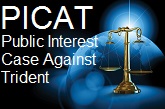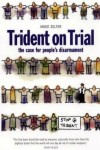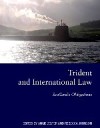by John M. Hull
As 2015 approaches when the vote will be taken about Trident in Parliament, it is worth considering the ethical implications of government policy as most recently declared in the White Paper from 2006.
Following a debate in the House of Commons on14th March 2007, the UK government by 409 votes to 161 voted to support the renewal of the UK nuclear deterrent.
Government policy was based upon a paper published by the Ministry of Defence in December 2006 entitled, ‘The Future of the United Kingdom’s Nuclear Deterrent’, with an introduction by the then Prime Minister,Tony Blair. This paper examines the ethical character of the government document. It does not deal with the wider issues of the ethics of nuclear warfare in general.
Eight areas of ethical concern will now be described.
1. The Policy of Enduring Deterrence:
Attempts have been made in the past to show that a policy of nuclear
deterrence may be ethically acceptable if its duration is strictly limited.
It must be nothing but a step on the way towards the complete
elimination of nuclear weapons.
This limited ethical approval for the policy of deterrence was specified
by Pope John Paul II in his message to the Special Session of the
United Nations on Disarmament, no. 8 in June of 1982.
In current conditions, deterrence based on balance certainly not
as an end in itself but as a step on the way towards a
progressive disarmament, may still be judged morally
acceptable. Nonetheless, in order to ensure peace, it is
indispensable not to be satisfied with this minimum which is
always susceptible to the real danger of explosion…
In their statement ‘The Harvest of Justice is Sown in Peace’ (17
November, 1993), the Catholic Bishops of America declared,
“Nuclear deterrence may be justified only as a step on the way
toward progressive disarmament…The nuclear powers may
justify, and then only temporarily their nuclear deterrence only if
they use their power and resources to lead in the construction of
a more just and stable international order… (Such a policy)… is
the only moral basis for temporally retaining our deterrent.”
This reluctant concession, offering a minimal ethical consent, gained
whatever plausibility it had from the situation in the 1980s when the
conditions of mutually assured destruction (Brad) prevailed as a
constraint between the two major nuclear powers. Even then it was a
flimsy argument and it has become less and less convincing with the
passage of time, and the changes in world politics. However, even this
minimal condition is disregarded by the White Paper, which describes
its nuclear policy as enduring.
It is immediately clear from the opening statement by the Prime
Minister himself that what the White Paper has in mind is a very long
term, if not a permanent feature of British defence policy.
“We believe that an independent British nuclear deterrent is an
essential part of our insurance against the uncertainties and
risks of the future…I believe it is crucial that for the foreseeable
future British prime ministers have the necessary assurance that
no aggressor can escalate a crisis beyondUKcontrol.”(p5)
Mr Blair goes on to announce a reduction of about 20% in the number
of warheads, and that this ’meansBritaincontinues to set an example
for others to follow’ (p5). However, the Prime Minister does not declare
that this reduction is to be part of a long term plan involving further
reductions. He says that there will be consideration of the possibility of
reducing the number of submarines from four to three, but this will only
take place if the three prove to have the same or similar capability as
the present four.
Turning to the body of the document, we find the following declaration.
“We can only deter such threats in future through the continued
possession of nuclear weapons…!
We therefore see an enduring role for theUK’s nuclear forces as an essential part of our capability for deterring blackmail and acts of aggression against
our vital interests by nuclear-armed opponents.” (p7)
It is claimed that this is ‘consistent with our commitment to work toward
a safer world in which there is no requirement for nuclear weapons’
(p7), but there is no comment upon the hiatus between this claim and
the policy of ‘enduring possession’ of nuclear weapons. It is true, as
the report points out, that theUKof all the nuclear powers has the
smallest stockpile of weapons, and that theUKis the only country to
reduce its nuclear capability to a single arm, but such comments look to
the past and do not constitute a programme of steady continued
reduction such as to suggest that the ethical requirement is met which
insists that deterrence can only be justified if it is a temporary measure
on the way to something else. No doubt, theUKis ‘working multilaterally
for nuclear disarmament and to counter nuclear proliferation’
(p8) but the ethical character of British policy cannot be assured by
such international objectives unless supported by a compatible policy
on the part of theUKitself.
The White Paper continues by speaking of
“the continuing risk from the proliferation of nuclear weapons,
and the certainty that a number of other countries will retain
substantial nuclear arsenals, mean that our minimal nuclear
deterrent capability … is likely to remain a necessary element in
our security. (p12)”
It is a pity that the document does not indicate any actual measures
that might be taken to minimise the risk of nuclear proliferation or to
discourage other nations in the maintenance of their nuclear arsenals,
in spite of such noble sentiments as the assertion that ‘We stand by our
unequivocal undertaking to accomplish the total elimination of nuclear
weapons’ (p13). But how? By what means? And in our life time? ‘The
fundamental principles relevant to nuclear deterrence have not
changed since the end of the Cold War, and are unlikely to change in
the future’ (p17). If that is the case, deterrence will be permanent, and
talk of nuclear disarmament is mere dreaming. ‘Enduring principles
underpin theUK’s approach to nuclear deterrence.’ (p17)
It is thus clear that deterrence is not, as demanded by the moral
teaching of the Catholic Church, to be a temporary provision pending a
planned reduction but a permanent feature of the lives of British
citizens.
2. The Principle of Discrimination:
A basic principle for minimising the barbaric character of warfare is that
deliberate attacks should be directed only at the opposing armed
forces and not to civilian populations. It must be emphasised that
observing this principle of discrimination does not make war ethical.
When it is ignored, however, the unethical character of the military
action would be undeniable. Admittedly, it is not easy to draw a clear
distinction today between military personnel and civilians. We would
have to consider the position of the many thousands of civilians who
directly or indirectly maintained the armed forces. We would also have
to distinguish between the deliberate killing of innocent bystanders and
what today is called ‘collateral damage’ i.e. the unintended and
unavoidable civilian casualties that occur in spite of the fact that the
intended target is the enemy military. In the light of this principle it
might be argued that tactical or battlefield weapons are consistent with
the principle of discrimination because the target is not the civilian
population of the area.
If this is the case, then we may ask whether the nuclear deterrent of the
UKis conceived of as strategic or tactical. The White Paper asserts
that ‘Conventional capability cannot have the same deterrent effect’
(p7). It is not easy to see why the limited use of tactical weapons on the
battlefield would have a deterrent effect beyond that of conventional
weapons, apart from the threat of escalation, and it would therefore
appear that what the government has in mind is strategic weapons.
This is supported by the following comment. ‘Ballistic missiles are more
effective than cruise missiles because they have much greater range
and payload.’ (p7). Any remaining doubt is removed in the following
sentence.
TheUK’s nuclear weapons are not designed for military use
during conflict but instead to deter and prevent nuclear blackmail
and acts of aggression against our vital interests that cannot be
countered by other means. (p17)
The nuclear deterrent deters precisely because it is a weapon of mass
destruction. Not only do such weapons not distinguish between military
and civilian targets, their scale and impact upon surrounding areas, the
environment and future generations means that they cannot do so;
indeed this is precisely what they are intended to do. They are political
not military because they are intended to terrify entire populations. Not
only do they fail to comply with the principle of discrimination; they
openly and shamelessly defy it. There can be no doubt, then, that
these weapons are barbaric.
3. The Ethical Character of the Threat and of the Use in First Strike and
Second Strike:
Up to this point, most people would probably agree. Nobody denies
that strategic nuclear weapons are terrible almost beyond imagination.
The government admits that it is reluctant to possess them
“We would not want to have available the terrifying power of
these weapons unless we believed it to be necessary to deter a
future aggressor.” (p5)
The purpose of these weapons is not to use them but to prevent their
use. They are intended to forestall the massive destruction of civilian
populations. They express the hope of securing peace through fear.
We must ask, however, whether this kind of threat can be ethically
justified even if the fear which produces it is reasonable. Nuclear
weapons of this kind are in a class of their own. Every day illustrations
such as threatening to give a bully a black-eye are misleading and
inapplicable. The analogy might be rather to threaten not only the bully,
but the entire household of the bully, the city in which he lives,
hundreds if not thousands of miles of surrounding territory and the
bully’s descendants for several generations.
The ethical dilemma is highlighted today by the fact that the most likely
source of a nuclear threat toBritaincomes not from other nations but
from terrorist groups who cannot be deterred by the threat because
they are ready for a martyr’s death. Not only is it unethical to threaten
to kill millions of people in order to deter them from killing millions of
your own people, but the threat loses whatever political integrity it had
when it is poised, with all its horror, against a secret foe who cannot be
deterred.
The deterrent implies the willingness to carry out the deed. To justify
committing the deed on the ground that it will never be necessary to
commit the deed is a strange and dangerous logic. Moreover, the
policy is incompatible with a readiness to strike first.
The White Paper declares, ‘We will not rule in or out the first use of
nuclear weapons’ (p18). If first use were against another nuclear
power, would not that nation consider that retaliation was justified, for
its own deterrent policy would then have failed? And if first use was
against a non-nuclear power, how could it be justified on the grounds
that a strategic nuclear attack had to be averted?
Let us now consider the possible second use of a strategic nuclear
weapon. If such weapons are to be justified at all, it can only be as a
deterrent. However, if the deterrent should fail, the ethical situation is
substantially altered. Any use of the weapons following the failure of
deterrence would no longer be deterrent but vengeful, retaliatory and
murderous. Would it be ethical to murder millions of people because
millions have already been murdered? This would be nothing more
than the crudest form of blood feud raised to the ultimate limit of horror.
The men in charge of the weapons in the submarine are placed in a
position of terrible ethical paradox. The finger must be poised above
the red button if a credible threat is to be maintained, but is the finger to
come down on the button when that policy has failed? The same
ethical paradox would confront the Prime Minister of the day, who
faced with the report of a nuclear attack on aUKtarget, would have to
decide whether it would be useful, appropriate and ethical to take out a
foreign city in return for one of our own. Would that perhaps deter a
second attack? But deterrence that failed the first time would perhaps
fail again. So then is it to be city for city until the world is destroyed?
Let us suppose that the commander of a submarine were to make a
mental decision, foreseeing this terrible emergency, that he would not
accept the retaliatory order. That mental decision would for ever have
to remain a secret, for if it became known, or even rumoured, the
credibility of the deterrent would have been compromised.
If deterrence fails, the resulting use of strategic nuclear weapons would
no longer be deterrence but vengeance. It is not ethically permitted to
destroy life in revenge. Moreover, since there is thus an ethical
distinction between the success and the failure of deterrence, those
responsible for firing the missiles would have to be informed as to
whether the firing they had been instructed to initiate was deterrent or
vengeful. If not, the moral status of the operatives would be impaired
and their human rights ignored. In fact, the submarine crew are only
given a set of coordinates and the instruction to fire. They do not know
what or at whom the missile is directed. There can be no doubt that
both the order and the response both severally and together commit a
crime against humanity, their own and that of others.
In short, the ethical status of nuclear deterrents cannot be maintained
because willingness to commit the act itself is implied in the deterrence.
4. The Principle of Last Resort:
Moral reasoning demands that in order to meet the requirements of
justice in warfare, it must be a last resort. The White Paper does not
make this clear, but uses such expressions as ‘in our vital interests’ or
‘to avoid blackmail’. These concepts are not explained, and suggest
that the moral implications of last resort have not been grappled with.
In spite of the fact that earlier statements affirm that theUKnuclear
deterrent would only be used when all other means had failed, and the
very existence of the state was threatened, the present paper is
ambiguous on the issue. The favourite expression used is ‘our vital
interests’. The Prime Minister says ‘We cannot be sure that a major
nuclear threat to our vital interests will not emerge’ (p5). In the past, our
deterrent has been used ‘only to deter acts of aggression against our
vital interests’ (p6). The other phrase which is used to describe the
situations in which the nuclear weapons might be used is to prevent
what the White Paper calls ‘blackmail’. We must not ‘be constrained by
nuclear blackmail by others’ (p5). The purpose of the nuclear force is
for ‘deterring blackmail and acts of aggression against our vital
interests by nuclear-armed opponents’ (p7).
There is no discussion of what is meant by these expressions.
Moreover, when theUKpresses its vital interests, supported by nuclear
force, other countries are likely to experience this as nuclear blackmail,
just as theUKperceives blackmail when its vital interests appear to be
threatened. In correspondence, the MOD has indicated that nuclear
weapons would only be used as a last resort, when the very existence
of the state was in danger. It is disturbing that no such statements
occur in the White Paper. I am not suggesting that theUKgovernment
might be prepared to use the threat of nuclear weapons merely to
secure a trade agreement, but I am pointing out the superficiality and
vagueness of the thinking behind the White Paper, its failure to work
out the implications of its policy, and the shallow morality that underlies
it.
5. The Principle of Proportionality:
Justice in warfare also demands that action inflicted upon the enemy
should be proportionate to the offence. Although the word
‘proportionate’ does occur in the document, it is not discussed or
explained. ‘Any state that we can hold responsible for assisting a
nuclear attack on our vital interests can expect that this would lead to a
proportionate response.’ (p19) It is difficult to see how in response to
blackmail or in order to secure vital national interests, it would be
proportionate to launch strategic missiles against civilian populations
on such a massive scale.
It might be argued that if an enemy attack were to obliterate a British
city, the counter destruction of a comparable enemy city would be
proportionate. This, however, assumes second strike, and to destroy
an enemy city in advance would not be proportionate and would
encourage retaliation. Moreover, a feature of nuclear weapons is their
damaging effect not only upon the immediate victims but upon
subsequent generations yet unborn, and upon populations within reach
of the fall out, a factor difficult if not impossible to predict with any
accuracy. For this reason alone, any use of strategic nuclear weapons
must be regarded as disproportionate.
6. The Principle of the Minimisation of Suffering:
Far from strategic nuclear weapons minimising human suffering, it is
their very purpose to maximise suffering and thus to cause terror. The
government document makes no reference to death, wounding,
casualties, or suffering, and one could read it without penetrating below
its surface to its human misery of which it speaks in calm technical
terms. For example, consider the implications of the concept of greater
payload. ‘Ballistic missiles are more effective than cruise missiles
because they have much greater range and payload…’ (p7)
7. Justice and Peace between the Nations:
The Government has from time to time promised to adopt an ethical
stance in international relations. This is confirmed by the assurances in
the current White Paper that the country will continue to work for peace
and toward the total elimination of nuclear weapons. However, the
rationale for the continuance and upgrading ofBritain’s nuclear force is
couched in very different language. The idea that theUKmight be able
to depend upon the continued protection of its allies to defend it in any
ultimate crisis is dismissed, because a potential nuclear aggressor
“could gamble that theUSorFrancemight not put themselves at
risk of nuclear attack in order to deter a nuclear attack on theUK
or our allies.” (p18)
On this kind of thinking every ally of theUKshould develop its own
nuclear facility, because one of their potential adversaries might also
gamble that theUKmight not risk an attack upon itself in order to deter
an attack upon the ally. It is just this kind of perverse logic that makes
progress towards multilateral nuclear disarmament so difficult. ‘It is a
key responsibility of government’, the White Paper claims, ‘ to be sure
that theUKis properly protected should the future turn out to be less
secure than we hope’ (p18). But any government of any nation might
make such a claim. Does not the Norwegian government, and the
Canadian government also have the same obligation? How can
nuclear proliferation be prevented if every government adopts a similar
policy to secure its citizens against a nuclear future?
The White Paper illustrates this problem of security by pointing out the
deficiencies of its intelligence services.
“There are limits to the extent to which intelligence can inform us
about medium to long-term changes in the nuclear capabilities of
others, or give prior warning of a possible change in intent by an
existingnuclear weaponsState. We must therefore be realistic
about our ability precisely to predict the nature of any future
threats…” (p18)
This policy appears to be based upon a thinly disguised fear of the
USA,France,Russia,India,PakistanorChina. No doubt any nation in
the present state of human development will prefer its own interests to
those of another state, but why should this affect theUKany more than
Brazil,JapanorSweden? Would we fear the nuclear states more if the
UKwere not a nuclear state? Probably not! In that case, we must live in
fear, whether we have the nuclear weapons or not, and since fear
would drive an arms race, there is little hope of preventing further
proliferation. The White Paper claims that ‘We will continue to work
actively with all our friends and partners to enhance mutual trust and
security…’ (p19). However, the meaning of this must be set against the
following comment, ‘We believe that our nuclear deterrent should retain
our existing capability to deter threats anywhere in the world’ (p22). It
cannot be morally right to formulate a policy based on fear and mistrust
which as such inhibits the development of peaceful relations between
the nations. Policies that spring from fear lead to an increase of fear
when implemented, and this contributes to a general increase in fear,
to which more and more nations will succumb, and thus peace will
recede.
8. The Ethics of Government:
The fundamental weakness underlying the paper as a whole is its
inadequate philosophy of government. This is expressed as follows by
Mr Blair. ‘The primary responsibility of any government is to ensure the
safety and security of its citizens’ (p5). The Executive Summary begins
with a contrasting conception of governmental duty. ‘TheUKis
committed to helping to secure international peace and security’ (p6)
followed by a return to the first thought: ‘The Government’s primary
responsibility is for the security of current and futureUKcitizens’ (p6).
The White Paper reveals some awareness of the tension between
these two responsibilities, and seeks to reach a balance between them.
“We believe this is the right balance between our commitment to
a world in which there is no place for nuclear weapons and our
responsibilities to protect the current and future citizens of the
UK. “(p8)
If these statements are true, and the nature of the balance between
them is correct, then the weakness of this philosophy of government is
sharply illuminated. If every government in the world conceived of its
primary duty in such a manner, and in a context of general suspicion
was satisfied with this adjustment of the balance, the world would
inevitably become a much more dangerous place, the threat now
hanging not only over theUKbut over all humanity being intensified.
It is the function of the state not only to maintain the security of its
citizens, but also to restrain evil and to promote and secure justice.
Since the intentions of the government, or at least of the MOD and the
Prime Minister, are to continue with an enduring manufacture and
deployment of weapons of mass destruction, since the character of the
fairness they profess is not divulged, since they persist in the legitimacy
of a world divided into nuclear and non nuclear states, and since they
do not announce a planned future reduction of nuclear arms in a series
of steps, the philosophy of the state to which they adhere must be
denounced as incompatible with the demands of justice.
There can be no doubt that the spiritual consequences of the policy of
this government, as announced in the White Paper, will lead to a
further deterioration of the moral and spiritual quality of the people of
theUK. This is because they will be encouraged to adopt an attitude of
fear and suspicion towards the world, and in so doing, to be prepared
to use weapons which constitute a crime against humanity.
Moreover, the people of this country would have to live day by day in
the knowledge of the fact, if it becomes a fact, that every day for at
least ten years and maybe twenty-five years, they were willing to spend
between many millions ofUKpounds to make it possible for them to
threaten to destroy, and to actually annihilate if necessary, millions of
other people in the most horrible circumstances. Most people could not
live with this daily knowledge, and would therefore seek protection in
ignorance, self-deception and pleasure. This would lead to a
deadening of the conscience and a repression of natural human
kindness.
Conclusion
It has become obvious during the course of this discussion that the
moral insensitivity of the government White Paper is not a matter of
careless drafting. The problem goes deeper than that. The truth is that
the more attention one were to pay to ethical questions, the less
acceptable the document, and hence the policy itself, would become.
The nature of the policy makes it necessary that the ethical questions
should be avoided. But to avoid such questions is to avoid one’s own
humanity.
About the Author
John M Hull is Honorary Professor of Practical Theology in The Queen’s
Foundation for Ecumenical Theological Education and Emeritus Professor of
Religious Education at theUniversityofBirmingham. His web site is
www.johnmhull.biz.
10












 Nuclear weapons crime in the UK has been reported to Thames Valley Police.
Nuclear weapons crime in the UK has been reported to Thames Valley Police.










